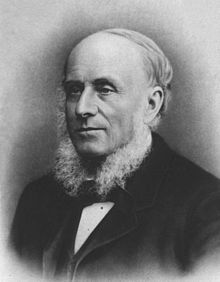Alexander Bain
| Alexander Bain | ||
|---|---|---|
 | ||
| Información personal | ||
| Nacimiento | 11 de junio de 1818  Aberdeen (Reino Unido de Gran Bretaña e Irlanda)  | |
| Fallecimiento | 18 de septiembre de 1903  Aberdeen (Reino Unido de Gran Bretaña e Irlanda)  | |
| Nacionalidad | Británica | |
| Educación | ||
| Educado en |
| |
| Información profesional | ||
| Ocupación | Psicólogo, filósofo, profesor universitario y escritor  | |
| Área | Filosofía, educación y psicología  | |
| Cargos ocupados |
| |
| Empleador | Universidad de Aberdeen  | |
[editar datos en Wikidata] | ||
Alexander Bain. (Aberdeen, 11 de junio de 1818-ibíd. 18 de septiembre de 1903) fue un filósofo, psicólogo y educador escocés.[1]
Vida y obra
Alexander Bain aunque provenía de una familia muy humilde económicamente, por su sudor y trabajo logró ser admitido en el colegio de su ciudad natal,[2] luego realizó una brillante carrera universitaria. Alexander Bain en su carácter de filósofo escribió "positivismo inglés". Se destacó en la aplicación de la filosofía a la psicología; en 1840 comenzó a colaborar en la Westmisnter Review y conoció a John Stuart Mill con quien mantuvo una prolongada amistad. Fue nombrado profesor en la Universidad de Glasgow, en 1845, aunque al año siguiente declinó ese cargo para dedicarse a escribir. En 1848 se trasladó a Londres donde publicó Los sentidos y el intelecto (1855) y Las emociones y la voluntad (1859). En 1860 fue nombrado por la corona británica catedrático de lógica y literatura inglesa en la Universidad de Aberdeen cargo en el cual se mantuvo hasta 1880, en esa época y en su ciudad natal fue cofundador de la revista científica Mind (Mente) al tiempo que fue un renovador de la psicología al hacerle aprovechar los descubrimientos de la fisiología y la patología, siendo un destacado representante del asociacionismo insistió en la actividad espontánea del cerebro y defendió posturas idealistas contra el realismo de Herbert Spencer. Publicó también libros escolares y de divulgación científica.
Principales libros

- El sentido y el intelecto (1855)
- Las emociones y la voluntad (1859)
- Estudio del carácter (1861)
- Lógica deductiva e inductiva (1870)
- La mente y el cuerpo (1873)
- La ciencia de la educación (1879)
- Estudios sobre James Mill y Stuart Mill (James Mill. A biography, 1882)
Honores
Eponimia
- Bachillerato Alexander Bain en ciudad de México y sus escuelas anexas.[3]
Bibliografía
- "Early Life of James Mill", en Mind 1 (1) (enero de 1876).
- Review of Herbert Spencer's Principles of Sociology, Mind 1 (1) (enero de 1876).
- "Mr. G. H. Lewes and the Postulates of Experience" Mind 1 (1) (enero de 1876).
- Education as a Science, New York: D. Appleton & Co. 1884
- Practical Essays
- Dissertations on Leading Philosophical Topics
- Autobiography by Alexander Bain, LL.D. Londres: Longmans, Green & Co. 1904
- Elements of chemistry and electricity: en dos partes
- Astronomía
- James Mill, A Biography (1 edición), London: Logmans, Green & Co., 1882, consultado el 11 de diciembre de 2012 .
- John Stuart Mill: A Criticism: With Personal Recollections, London: Longmans, Green & Co. 1882
- The Art of Study
- Is There Such a Thing As Pure Malevolence?
- The Classical Controversy
- The University Ideal: Past and Present
- On Teaching English: With Detailed Examples and an Enquiry Into the Definition of Poetry
- English Composition and Rhetoric: Emotional qualities of style
- English Composition and Rhetoric: Intellectual elements of style
- English grammar as bearing upon composition
- First English Grammar
- A Higher English Grammar
- An English grammar
- English composition and rhetoric: A manual
- Logic: Induction
- Logic: v. 1
- Deduction
- Some Points in Ethics
- Fragments on ethical subjects
- The Moral Philosophy of Paley
- The emotions and the will 1859
- The senses and the intellect
- Mind And Body: The Theories Of Their Relation
- Physiological Expression in Psychology
- Analysis of the phenomena of the human mind: v. 1
- How to study character; or, The true basis for the science of mind
- The emergence of neuroscience in the nineteenth century: Mind and body : the theories of their relation
- Pleasure and Pain
- On the study of character: including an estimate of phrenology
- Mental science: a compendium of psychology, and the history of philosophy, designed as a text-book for high-schools and colleges
- Moral science: a compendium of ethics
- Mental and moral science: A compendium of psychology and ethics, London: Longmans, Green & Co. 1868
- Mental and Moral Science: Psychology and history of philosophy
- Mental and Moral Science: Theory of ethics and ehtical systems
Referencias
Enlaces externos
 Wikisource en inglés contiene obras originales de Alexander Bain.
Wikisource en inglés contiene obras originales de Alexander Bain. Wikimedia Commons alberga una categoría multimedia sobre Alexander Bain.
Wikimedia Commons alberga una categoría multimedia sobre Alexander Bain.
 Datos: Q384882
Datos: Q384882 Multimedia: Alexander Bain / Q384882
Multimedia: Alexander Bain / Q384882












